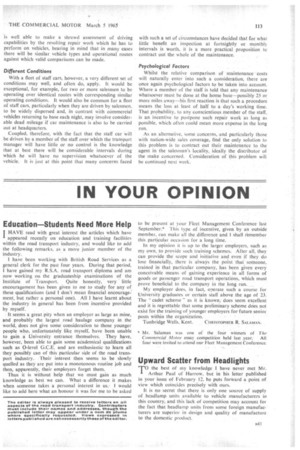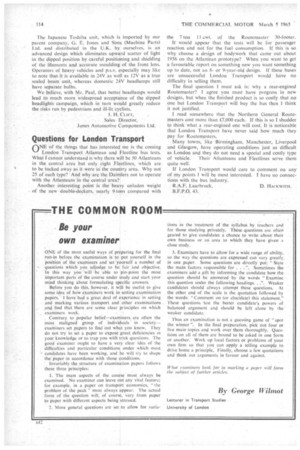IN YOUR OPINION
Page 115

Page 116

If you've noticed an error in this article please click here to report it so we can fix it.
Education—Students Need More Help
I HAVE read with great interest the articles which have I appeared recently on education and training facilities within the road transport industry, and would like to add the following remarks, as a more junior member of the industry.
I have been working with British Road Services as a general clerk for the past four years. During that period, I have gained my R.S.A. road transport diploma and am now working on the graduateship examinations of the Institute of Transport. Quite honestly, very little encouragement has been given to me to study for any of these qualifications (and I don't mean financial encouragement, but rather a personal one). All I have learnt about the industry in general has been from incentive provided by myself.
It seems a great pity when an employer as large as mine, and probably the largest road haulage company in the world, does not give some consideration to those younger people who, unfortunately like myself, have been unable to gain a University entrance themselves. They have, however, been able to gain some academical qualifications such as 0-level G.C.E. and are enthusiastic to learn all they possibly can of this particular side of the road transport industry. .Their interest then seems ta •be slowly quelled as they are put into a monotonous routine job and then, apparently, their employers forget them.
Thus it is without help that we must gain as much knowledge as best we can. What a difference it makes when someone takes a personal interest in us.I would like to add here what an honour it was for me to be asked
to be present at your Fleet Management Conference last September.* This type of incentive, given by an outside member, can make all the difference and I shall remember this particular occasion for a long time.
In my opinion it is up to the larger employers, such as my own, to provide such training schemes. After all, they can provide the scope and initiative and even if they do lose financially, there is always the point that, someone, trained in that particular company, has been given every conceivable means of gaining experience in all forms of goods or passenger road transport operations, which must prove beneficial to the company in the long run. ,
My employer does, in fact, operate such a course for University graduates or certain staff above the age of 23. The "cadet scheme as it is known, does seem excellent and it is regrettable that some preliminary scheme does not exist for the training of younger employers for future senior posts within the organization.
Tunbridge Wells, Kent. , CHRISTOPHER R. SALAMAN.
* Mr. Salaman was one of the four winners of Mr
Commercial Motor essay competition held last year; All four were invited to attend our Fleet Management Conference.
Upward Scatter from Headlights
TO the best of my knowledge I have never met Mr. Arthur Paul of Harrow, but in his letter published in your issue of February 12, he puts forward a point of view which coincides precisely with ours.
It is no secret that there is only one source of supply of headlamp units available to vehicle manufacturers in this country, and this lack of competition may account for the fact that headlamp units from some foreign manufacturers are superior in design and quality of manufacture to the domestic product.
The Japanese Toshiba unit, which is imported by our parent company, G. E. Jones and Sons (Machine Parts) Lt& and distributed in the U.K. by ourselves, is an advanced design which eliminates upward scatter of light in the dipped position by careful positioning and shielding of the filaments and accurate moulding of the front lens. Operators of heavy vehicles and p.s.v. especially may like to note that it is available in 24V as well as 12V as a true sealed beam unit, whereas domestic 24V headlamps still have separate bulbs.
We believe, with Mr. Paul, that better headlamps would lead to much more widespread acceptance of the dipped headlights campaign; which in• turn Would greatly reduce the risks run by pedestrians and ill4iacyclists.
I. H. CLIFF, Sales • Director, Jones Automotive Components Ltd.
Questions for London Transport
nNE of the things that has interested me is the coming London Transport Atlantean and Eleetline bus tests. What I cannot understand is why there will be 50 Atlanteans in the central area but only eight Fleetlincs, which are to be tucked away as it were iri the country area. Why not 25 of each type? And why are the Daimlers not to operate with the Atlanteans in the central area?
Another interesting point is the heavy unladen weight of the new double-deckers, nearly 9 tons compared with the 7 ton 11 cwt. Of the Routernaster' 30-footer.
It would appear that the tests will be for passenger reaction and not for the fuel consumption. If this is so why choose a design of bodywork that came out about 1956 on the Atlantean prototype? When you want to get a favourable report on something new you want something up to date, not an 8or 9-year-old design. If these buses are unsuccessful London Transport would have no difficulty in selling them.
The final question I must ask is: why a rear-engined Routemaster? I agree you must have progress in new design's, but when the finished product is so costly that no one but London Transport will buy the bus then 1 think it not justified.
I read somewhere that the Northern General -Route-, anasters cost more than £7,000 each. If this is so I shudder to think what a rear-engined one will cost. It is noticeable that London Transport have never said how .much they pay for Rotttemasters.
Many towns, like Birmingham, Manchester, Liverpool and Glasgow, have operating conditions just as' difficult as London and they do not need a special and costly type of vehicle. Their Atlanteans and Fleetlines serve them quite well.
If London Transport would care to comment on. any' of my points I will be most interested. I have no connections with the bus industry.
R.A.F. Laarbruck, D. HACKWITIL B.F.P.O. 43.




























































































































































